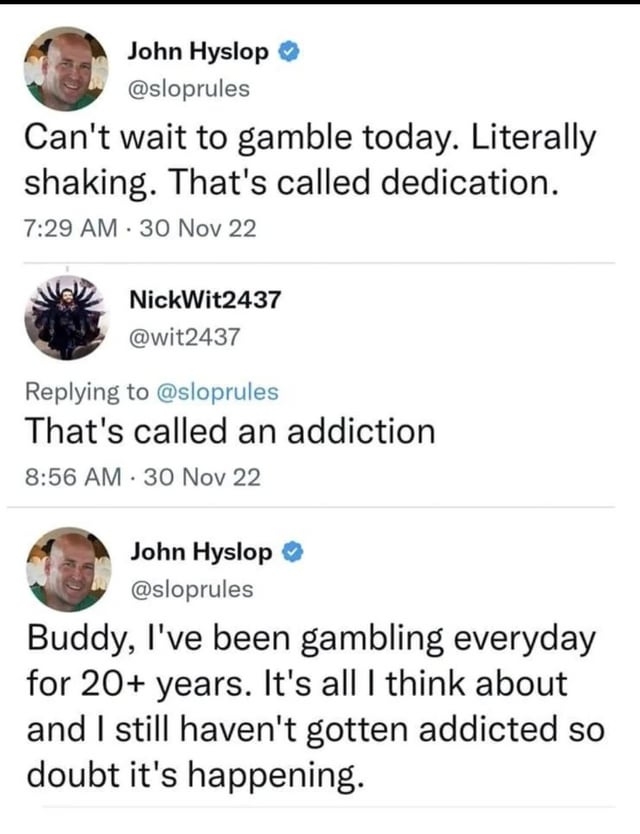seriously! like how do you become addicted to coffee, I drink it regularly but I can’t say I am caffeine addict or something. how one become a caffeine addict?
If you drink it regularly it’s already got you
I smoke cigarettes every day, but that doesn’t mean I’m addicted! i say this while fully addicted to caffeine
“I can quit any time I want. I just don’t want to.”
I smoked for a year, then one day I smoked and it made me feel like shit. No nice dizzy buzz, just felt like garbage. Didn’t smoke the rest of the day. Tried again the next day, felt like shit. I just stopped after that. I feel so lucky, I didn’t get any other cravings or withdrawals. My brain just suddenly associated smoking with that terrible feeling.
I tried more times over the years (this was over a decade ago) and the same feeling each time. The only time it feels good anymore is if I’m absolutely SMASHED.
Coffee did the same thing to me. My body feels AWFUL if I drink much caffeine anymore. This one I am NOT thankful for. I love black coldbrew and I miss it so very much. I’ve tried some decaf but it just felt like drinking NA beer. I hope one day I can drink coffee again.
You say you drink it regularly, have you ever tried to stop? If you suddenly experience headaches and shakes after, I’ve bad news for you.
The thing is, caffeine addiction is so heavily normalized and encouraged by our capitalist society that most people do not realize they’re addicted. They consume caffeinated products with enough regularity that they never crave it, and you’re only ever encouraged to stop if you develop a health issue.
I went from drinking 6-8 cups every day to zero when COVID popped off and suffered zero headaches. My body chemistry is weird.
Takes a few months. Most notable symptom of withdrawal is usually headaches, lasts a day or two. It’s not a severe addiction, it’s a fairly mild one as they go.
I got jacked up within 2-weeks of hitting energy drinks and espresso. The headaches were blinding for a day or three. Guess I was really hitting it hard.
Caffeine has a metabolic half life of 6-12 hours. This means that after a 24 hour period, there could be 1/4 of the original caffeine amount you drank in your system. If you drink the same amount of caffeine again at that point, now after a 24 hour period you ‘ll have up to 1/4 of that 1.25 amount in your system. If you consume caffeine daily, this can lead to an accumulation of caffeine that your body adjusts to always being there, becoming the new baseline normal. This would feel fine until you stop, at which point the caffeine your body expects to be there is gone, and it needs to take time readjusting to that absence. That leads to withdrawal symptoms.
This is the best explanation for caffeine withdrawals that I’ve read. Thanks for the enlightenment!

Drink a few cups a day for a year and then cut back to no caffeine.
If you get a headache you were addicted.
That’s drug dependence.
Isn’t that the same thing?
No
Depends on context. If you’re discussing it in a medical context, the terms are separate. Dependence refers specifically to the severity of the effects of stopping the drug, both physical and psychological. Addiction is more about the behavior of a person when exposed to the substances and is not as strictly defined of a term in a medical sense. But generally, dependence is a component addiction. So not all dependence results from addiction, but most definitions of addiction include some kind of dependence.
So, not the same thing, but also, outside of medical context, most people don’t differentiate the terms and use the word addiction to refer to the dependence component of addiction.
The context of fifth grade health class.
When the best part of waking up is folger’s in your cup that’s addiction
🎵
That cat in the hat and that was that
B U S T A R H Y M E S
Joke’s on you, I have headaches either way!
By drinking high doses over a long period of time. When I’m in withdrawal I get depressed and foggy with terrible headaches.
The good news is that it only takes a week or so to be completely free of withdrawal symptoms.
Caffeine is physically addictive but a coffee/tea habit isn’t unhealthy. So you get physically addicted by drinking it everyday (will get the headache if you don’t have it) but it’s unlikely to cause addiction in the sense of harming your ability to live your life, or having negative health effects.
I have relatives who would get headaches if they didn’t get it. People’s bodies respond differently.
How old are you? The side-effects or withdrawal symptoms didn’t really become noticeable for me until my mid-30s…I went from feeling fine whether I had caffeine or not, to getting a headache in the afternoon if I missed my morning coffee, to waking up with a headache already that wouldn’t go away until I upped my dose.
People conflate “Addicted” and “Dependant”. I’m not addicted to caffeine, but I will feel off by late morning if I haven’t had some.
This sounds like something an addict would say to cope with the fact that they have a dependency-based addiction to something.
https://www.medicalnewstoday.com/articles/addiction-vs-dependence
The terms “addiction” and “dependence” can seem similar, but they are different. Dependence occurs when the body physically relies on a drug. Addiction involves changes in behavior.
No clue. While I don’t drink coffee, I did drink caffeinated sodas for a large part of my life. One day I just decided to stop drinking soda. I felt no sort of addiction or withdrawal symptom.
with a hypodermic needle into the vein of your penis
I’d like to know more
Was that not part of your education Dr.?
I specialized in an adjacent field of study, actually.
Tell me taint so
might be worth it to consider that addiction is only a colloquial word for substance use disorders, which have strict diagnostic criteria
Friend of mine used to drink quadruple espressos at Starbucks every day, then go back to work. I was talking to him last week and told him about remembering the time he called me from the Starbucks and his name was called with the quadruple order. He laughed and said he actually bumped it up to quintuple at one point.
Then he sold his house and moved to another state, living out in the woods. Asked him how he managed without a Starbucks nearby. He said he now does Keurig espresso shots every morning. But it was getting expensive, since he had to press 10 pods in one sitting!
Moral of the story: he’s perfectly functional and productive. Go nuts!
Jesus what an inefficient way of doing it. Just buy a grinder and beans
There’s plenty of health costs to being addicted to caffeine. This devil may care attitude is dangerous.












